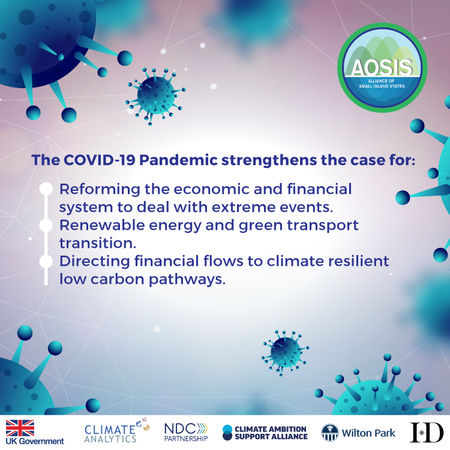Finance must be more accessible – and change from ‘brown’ to ‘green’

At the Placencia Ambition Forum, convened by the Alliance of Small Island States (AOSIS) and chaired by Ambassador Lois M Young online from 20-22 April, hot topics included climate finance and economic recovery from the COVID-19 outbreak. CASA’s Mairi Dupar reports.
Debates focused on three key aspects of finance and macroeconomic stability:
- Make public climate finance more accessible for small island developing states and least developed countries. Numerous speakers bemoaned the ‘tedious’ ,‘difficult’ and time-consuming processes involved in accessing international public finance to support climate change mitigation and adaptation projects. Satyanand Buskalawa of Mauritius’ Ministry of Environment said that like other Small Island Developing States (SIDS), his country is both environmentally and financially vulnerable. Mauritius faces a “lack of capacity and accredited entities to access funding from the Green Climate Fund and Global Environmental Facility,” he said – burdensome procedures prevent small and poorly-resourced countries from getting the finance they need.
- Consider debt relief for climate vulnerable countries. Many SIDS and LDCs face debt repayments that cripple the public purse just as they are looking to provide relief and boost resilience of their citizens in the face of multiple cascading disasters (such as the intersection of cyclone damage and coronavirus, described above). Omar Figueroa, Belize’s Minister of Fisheries, Forestry, the Environment and Sustainable Devleopment called for immediate cancellation of SIDS’ debts to aid their recovery.
- Avoid fossil fuel lock-in as part of coronavirus response measures, embrace green stimulus measures. It is not just about turning on the tap for green finance to support actively pro-climate measures. There is a real risk that governments’ economic stimulus packages to protect industries and workers, in the face of the COVID-19 emergency, could prop up fossil fuel production and consumption and so lock in polluting pathways for decades to come. That was the message from Ambassador Selwin Hart, the UN Secretary General’s Special Envoy on Climate Change. Bail-outs for fossil fuel-based industries must be avoided, he cautioned. Investments, by contrast, should be fully in line with the Paris Agreement’s Article 2.1c: “Making finance flows consistent with a pathway towards low greenhouse gas emissions and climate-resilient development.” Svenje Schulze, German Minister for the Environment, recognised the same risks and the opportunity to use this moment of economic crisis to pivot to a low-emission future. She pledged that Germany’s Presidency of the European Union Council from July 2020 would make green recovery one of its central pillars.
The pandemic is now an economic disaster, reflected Dean Oliver Barrow, Prime Minister of Belize, in opening words that echoed through the Forum. “Life as we know it has been completely upended, changed forever. Science portends that …humanity must recalibrate its trajectory and realign with sound markers for sustainable development and do an about-face to hold temperatures to 1.5 oC. Failure to do so will breach the thresholds for planetary sustainability. Leading to a cascade from one catastrophe to another.”
History will reflect that we are now in a ‘defining moment’, Prime Minister Barrow noted, where we must respond with level heads to the intricately connected health, economic and climate crises.
With 2020 the year that countries are due to enhance their NDC ambitions and also to table their long-term strategies for climate change mitigation, the Placencia Ambition Forum was a timely event to keep the drumbeat of climate ambition alive. It raised everyone’s eyes to the mid-century target for net-zero emissions to keep to 1.5 oC of global warming, which requires urgent and collective action – and adequate resourcing – today.
For more information
Read the associated blog: Placencia Ambition Forum keeps the drumbeat of climate ambition alive.
For videos of the keynote speakers at the Placencia Ambition Forum, and more headline messages, please search #PlacenciaAmbitionForum and #SIDSLead on twitter.
The Alliance for Small Island States is a coalition of 44 small island and low-lying coastal developing states from the Caribbean, Pacific, and African, Indian and South China Seas regions, including five observers: read more about AOSIS’ membership. Please find more information about the Placencia Ambition Forum and the Alliance for Small Island States at www.aosis.org